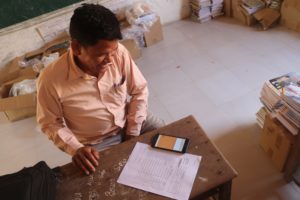 The World Bank recently published a blog post that explored “Three Steps to Get Every Child Reading.” The piece examines “learning poverty” and the global learning crisis which have been exacerbated by the COVID-19 pandemic. In 2019, 53% of children in low- and middle-income countries were unable to read and understand a simple text by the age of 10. The blog post states that today, levels of learning poverty are increasing, and that at-home learning environments are a major factor in the uneven impact of the pandemic on education.
The World Bank recently published a blog post that explored “Three Steps to Get Every Child Reading.” The piece examines “learning poverty” and the global learning crisis which have been exacerbated by the COVID-19 pandemic. In 2019, 53% of children in low- and middle-income countries were unable to read and understand a simple text by the age of 10. The blog post states that today, levels of learning poverty are increasing, and that at-home learning environments are a major factor in the uneven impact of the pandemic on education.
One key way to address learning poverty is to ensure that books get into children’s hands. World Education’s Track and Trace project, funded by the World Bank Group through the Results in Education for All Children (REACH) Trust Fund, aims to improve transparency and accountability of the education supply chain in Cambodia by providing communities with visibility into the location of textbooks through the ordering and distribution process. The goal is to incentivize more accurate delivery of books and ensure books arrive on time and in the right condition.
Our Track and Trace (TnT) system enables government officials, school-level stakeholders—such as support committees and parent associations—local partners, and distributors to track the ordering and distribution of books and other supplies in real-time. Paper systems often result in delays, inaccuracies, and inefficiencies, and without tracking information, there is no way to know where books were lost or if they were received by schools.
With TnT in Cambodia, a combination of a chatbot, online forms, and a web-based dashboard are used to place orders and monitor distribution. World Education initially trained 624 school directors/deputies and 832 school support committee members on how to submit textbook requests and confirm deliveries through TnT systems on mobile phones.
“I like using the TnT system because it is faster and easier than requesting the textbooks by paper. It saves time and it is easy to correct the data if you make a mistake,” said one school director.
This project has shown great success. From 2017 to 2019 when the project was first piloted, 100% of school directors from 416 schools submitted textbook requests within 2 weeks, and data from TnT showed that 99% of the total number of books approved by the Ministry of Education, Youth, and Sports were received by school directors. In April of 2019, the Cambodian Minister of Education announced that the government would take over the management of the TnT system, and in 2020, they began using it nationwide. By early 2021, 97% of school directors across the country had used TnT on their mobile phones to request their textbooks, and in the last months of 2021 they will be using it to confirm book deliveries. Together, we can challenge the global learning crisis and reduce learning poverty in countries like Cambodia by ensuring consistent access to books.
As the World Bank highlights in their blog, “one pilot in Cambodia across 10 school districts found track-and-trace helped speed up the time it took to order books and gave school districts information on when books would arrive to facilitate better planning for classroom use.”
